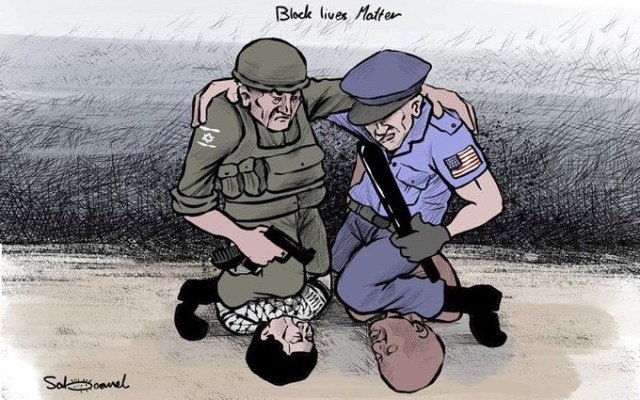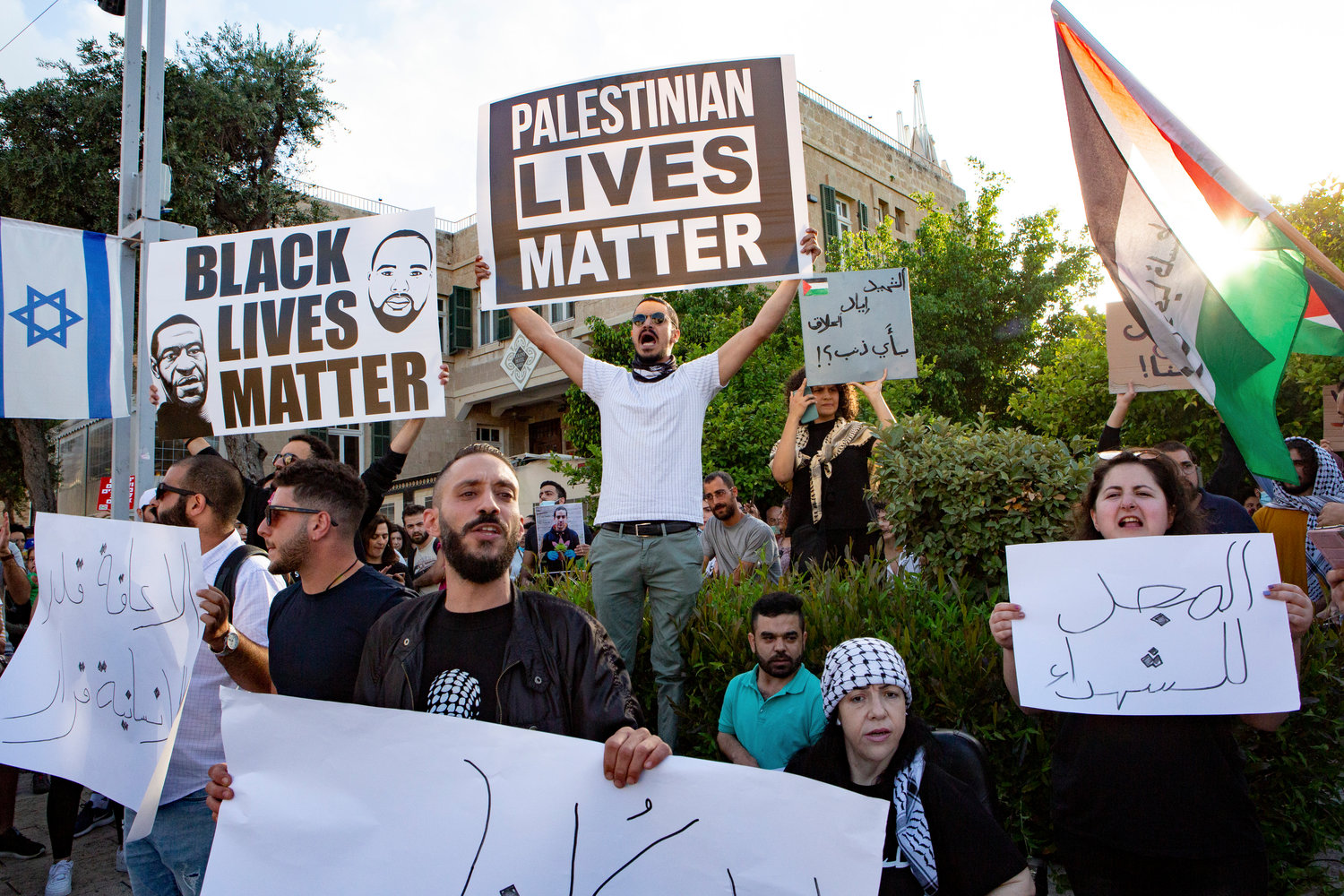Israel-US police cooperation: What it’s all about
More than 1,000 senior US police officers have visited Israel
In June, as protests against aggressive and abusive policing in the United States took hold, so did a false accusation about a group of programs that sends American police chiefs to learn from their counterparts in Israel.
“The tactics used by the police in America, kneeling on George Floyd’s neck, that was learnt from seminars with Israeli secret services,” a British actress told a newspaper in one illustrative incident. A member of the British Parliament was demoted for sharing the story laudingly on social media.
Over the past couple of months, the accusation has popped up elsewhere. It’s the latest version of a claim that has circulated in anti-Zionist circles for years — that US police delegations to Israel serve to import brutal and militarized policing to the US.
The organizations running the trips say that beyond being false — the trips do not teach physical, on-the-ground tactics such as chokeholds — the claim that Israel encourages American police brutality is an anti-Semitic canard.
There was police brutality in the US “long before any of these professional leadership exchanges happened, and are part and parcel of the history of the US,” said George Selim, senior vice president of programs at the Anti-Defamation League, which runs police delegations to Israel. “Seeking to link Israel as a state to US police misconduct is a bizarre excuse for the centuries-long history of racism and injustice that has been part of American history, really since our founding.”
The main organization opposing the delegations has been Jewish Voice for Peace (JVP), an anti-Zionist group that published a 2018 report calling the trips a “Deadly Exchange.” The report says they normalize “the violent repression of communities and movements the government defines as threatening.”
But while JVP is still campaigning against the trips, it said in June that “suggesting that Israel is the start or source of American police violence or racism shifts the blame from the United States to Israel” and “furthers an antisemitic ideology.”
Trip organizers and participants say the trips mostly consist of lectures, meetings and tours; they focus “on management and policy issues, not training, not specific tactical training,” said Steven Pomerantz, director of the Homeland Security Program at the Jewish Institute for National Security Affairs (JINSA), a conservative think tank that runs some of the delegations. “There’s no shooting, there’s no wrestling, there’s no chokeholds. That’s just not what this is about. It’s about the constituent parts of successful law enforcement [and] counterterrorism responsibilities in local policing.”
A focus on counterterrorism in a post-9/11 world
The delegations to Israel began in the 1990s and ramped up after the Sept. 11 attacks in 2001. The sponsoring organizations and their Israeli partners frame the trips as an opportunity for American police to learn from a country and police force with many decades of experience protecting civilian populations from attack.
“There was a lot of interest, and still is, in understanding the Israeli approach to terrorism and counterterrorism,” said Robbie Friedmann, who runs the Georgia International Law Enforcement Exchange, a program at Georgia State University that takes senior police officers on delegations to Israel and elsewhere. “Delegations learn about the need to provide balance between fighting terror and providing services, so that if someone gets their apartment burglarized, they know that’s something the Israel Police will take care of.”
More than 1,000 participants, mostly senior law enforcement officials, have gone on the trips, which are primarily provided by Friedmann’s program, the ADL and the Jewish Institute for National Security Affairs. Each organization has taken several hundred police officials to Israel, a small fraction of the leaders of the approximately 18,000 police departments in the United States. The trips are generally privately funded and are free for participants, though none of the organizations would share the exact sources of the funding or the costs of the trip.
Israel is far from the only country to host a delegation of police officials from abroad. Foreign police officers come to the United States to see how police forces here operate, and countries across the world also host delegations. Friedmann’s group has run tours in countries throughout Europe and South America, as well as in China, Australia and elsewhere.
And the trips are just one example of a whole industry of delegations to Israel. Jewish organizations regularly offer Israel trips to politicians, community activists, celebrities, students, business executives and an array of others. As with those trips, part of the goal of the police delegations is to acquaint the participants with Israel and give them a favorable view of the country.
The main goal of the trips, across the groups that organize them, is to share Israeli expertise in counterterrorism. Organizers say the trips are about observation, policy and systems, not about doing active-duty training or teaching American officers physical maneuvers.
“In Israel in general, confronted with the kind of threats they are, they’re still very resilient,” said Lou Dekmar, the chief of police of LaGrange, Georgia, and the past president of the International Association of Chiefs of Police, who has been on several delegations to Israel. “How important it is, when there is a crime or an attack, to quickly address it, process it and reintroduce a state of normalcy.”
American officials get to see their Israeli counterparts in action — from responding to a terror attack in real time to gathering intelligence to policing mass protests. In addition to the Israel Police, some of the trips meet with the Border Police, Shin Bet, and the army.
A 2019 itinerary from the ADL had the delegation observe security procedures at Ben Gurion Airport, a West Bank checkpoint and eastern Jerusalem, in addition to visiting the Gaza border and the Palestinian police. The delegation also visited Israel’s Police Academy and other Israeli police institutions, the Yad Vashem Holocaust museum, and Christian and Jewish religious sites.
“Law enforcement is law enforcement,” said Chief Janet Moon of the Peachtree City, Georgia, police, who visited Israel with Friedmann’s institute in 2015. “They have the same challenges with budgeting, resource allocation, community policing. And they’ve been dealing with terrorism a lot longer than we have.”
What’s it all about?
An interest in counterterrorism is not the only thing that Israeli and American police have in common. As in the United States, minorities in Israel have long complained of mistreatment from law enforcement, though in the case of Israel’s Arab minority, one recent protest movement called for more policing in Arab cities.
Israel Police officers also have been accused of profiling both Arab and Ethiopian Israelis, and recent years have seen large protests by the Ethiopian community against police brutality.
For participants in these programs, the extensive itineraries and opportunities for observation are seen as a benefit because Israeli and US police face similar challenges regarding crowd control, detection of terror threats, airport security and patrolling diverse populations. But to critics of the trips, who already oppose much of how Israel and America practice policing, the combination of the two is damning.
“Militarized, racist, violent policing in this country, rooted in centuries of colonization and slavery and warmaking here in the US, alongside Israeli occupation and the brutality enacted against Palestinians there — there’s no good sense in which those governments should be trading and cross training and developing relationships with one another,” JVP Executive Director Stefanie Fox said.
Her group’s “Deadly Exchange” report claims that the trip’s goals include “justifying racial profiling” and “suppressing public protests through use of force.”
“Yes, our police need to get better here in the United States,” said Yousef Munayyer, a Palestinian-American nonresident fellow at the Arab Center in Washington. “But do they really need to be training in a place and with forces where racial profiling is a value, where racial profiling is actually central to the ethos of the security system?”
What the trip participants bring home
The delegations do broach uncomfortable topics, organizers say. When it comes to racial profiling, for example, the Georgia State program’s Friedmann said, “We receive briefings based on the policies,” and that participants learn about the process for filing complaints.
“What’s important is not to suggest that Israel is a perfect society,” he said. “But it is a society based on the rule of law, and if an officer is behaving egregiously, it will be handled.”
Similarly, Selim said, the ADL trips naturally discuss the Israeli-Palestinian conflict, including on its visits to Palestinian police in the West Bank and to an Israeli border crossing. He said those portions of the trip are especially valuable for participants from border cities in the United States.
“It’s impossible to talk about policing and security in Israel without talking about the conflict,” he said. “When there are police executives from Southern California or from Texas or from Arizona, New Mexico, that have joined the delegation in the past two decades, these are in many instances border cities and border towns on the Mexican border.”
He added, “Issues of cross-border dialogue, engagement, holistic community policing in those cities is very real for them. So to see that in an international context is very helpful for a comparative sense of what works, what doesn’t.”
In addition to discussing counterterrorism, the trips also show Israel’s efforts at community policing in Arab-Israeli cities. Micky Rosenfeld, the spokesperson for the Israel Police, said the police have opened new police stations in Arab-Israeli areas and increased their efforts to recruit Arab police officers.
“The situation in America is complicated in the same way that the situation [in Israel] is also complicated,” he said. “Building an ongoing relationship with the community is something that takes time, and it has to come both from the community and law enforcement.”
Both Moon and Dekmar say they have been influenced by Israel’s approach to community policing. Dekmar noticed that the Israel Police has started recruiting Arab-Israeli cadets as early as high school to increase the chances that they’ll become officers. He says he began identifying and engaging minority high-schoolers as candidates to serve in his Georgia department as well.
The police chiefs have also implemented procedures or technologies they saw in Israel in their home departments. Moon installed a geo-location system in her 911 call center similar to one she saw in Israel. Dekmar said he adopted an Israeli mentality of conducting training more improvisationally, with less complex equipment.
“[I] recognize that this is a very complicated situation that doesn’t necessarily lend itself to good guys and bad guys,” Dekmar said. “It lends itself to an understanding of different cultures placed in a position that potentially could clash at any time.”

 45.0°,
Partly Cloudy
45.0°,
Partly Cloudy 







